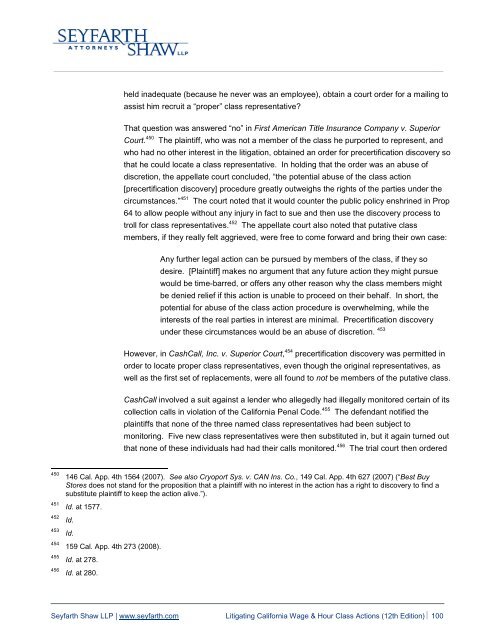Litigating California Wage & Hour and Labor Code Class Actions
Litigating California Wage & Hour and Labor Code Class Actions
Litigating California Wage & Hour and Labor Code Class Actions
Create successful ePaper yourself
Turn your PDF publications into a flip-book with our unique Google optimized e-Paper software.
held inadequate (because he never was an employee), obtain a court order for a mailing to<br />
assist him recruit a “proper” class representative?<br />
That question was answered “no” in First American Title Insurance Company v. Superior<br />
Court. 450 The plaintiff, who was not a member of the class he purported to represent, <strong>and</strong><br />
who had no other interest in the litigation, obtained an order for precertification discovery so<br />
that he could locate a class representative. In holding that the order was an abuse of<br />
discretion, the appellate court concluded, “the potential abuse of the class action<br />
[precertification discovery] procedure greatly outweighs the rights of the parties under the<br />
circumstances.” 451 The court noted that it would counter the public policy enshrined in Prop<br />
64 to allow people without any injury in fact to sue <strong>and</strong> then use the discovery process to<br />
troll for class representatives. 452 The appellate court also noted that putative class<br />
members, if they really felt aggrieved, were free to come forward <strong>and</strong> bring their own case:<br />
Any further legal action can be pursued by members of the class, if they so<br />
desire. [Plaintiff] makes no argument that any future action they might pursue<br />
would be time-barred, or offers any other reason why the class members might<br />
be denied relief if this action is unable to proceed on their behalf. In short, the<br />
potential for abuse of the class action procedure is overwhelming, while the<br />
interests of the real parties in interest are minimal. Precertification discovery<br />
under these circumstances would be an abuse of discretion. 453<br />
However, in CashCall, Inc. v. Superior Court, 454 precertification discovery was permitted in<br />
order to locate proper class representatives, even though the original representatives, as<br />
well as the first set of replacements, were all found to not be members of the putative class.<br />
CashCall involved a suit against a lender who allegedly had illegally monitored certain of its<br />
collection calls in violation of the <strong>California</strong> Penal <strong>Code</strong>. 455 The defendant notified the<br />
plaintiffs that none of the three named class representatives had been subject to<br />
monitoring. Five new class representatives were then substituted in, but it again turned out<br />
that none of these individuals had had their calls monitored. 456 The trial court then ordered<br />
450<br />
451<br />
452<br />
453<br />
454<br />
455<br />
456<br />
146 Cal. App. 4th 1564 (2007). See also Cryoport Sys. v. CAN Ins. Co., 149 Cal. App. 4th 627 (2007) (“Best Buy<br />
Stores does not st<strong>and</strong> for the proposition that a plaintiff with no interest in the action has a right to discovery to find a<br />
substitute plaintiff to keep the action alive.”).<br />
Id. at 1577.<br />
Id.<br />
Id.<br />
159 Cal. App. 4th 273 (2008).<br />
Id. at 278.<br />
Id. at 280.<br />
Seyfarth Shaw LLP | www.seyfarth.com <strong>Litigating</strong> <strong>California</strong> <strong>Wage</strong> & <strong>Hour</strong> <strong>Class</strong> <strong>Actions</strong> (12th Edition) 100
















